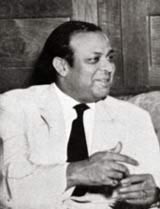Muhammad Ali Bogra
Muhammad Ali Bogra ( Bengali : মোহাম্মদ আলী বগুড়া , Mohāmmad Ālī Baguṛā ; * August 12, 1909 , † July 15, 1963 ) was a Pakistani politician of Bengali origin. He was Prime Minister of Pakistan from 1953 to 1955.
Life
Muhammad Ali Bogra came from a family of Muslim rulers ( Nawabs ) of Bengal . He studied at the University of Calcutta and then began a political career. In 1937 he was elected Bengal in the Parliament of the Province and was the Chief Minister of the province, Khawaja Nazimuddin , Health Minister .
After Pakistan's independence in 1947, Bogra was transferred to the Foreign Service and served in Burma ( Myanmar ), Canada and eventually as Ambassador to the United States .
Political career
In 1953, Bogra succeeded Khawaja Nazimuddin as Prime Minister and began drafting a new constitution for Pakistan. According to the so-called "Bogra formula", Pakistan should get a two-chamber parliament. The House of Lords should have 50 seats, ten for each province. Since West Pakistan had four provinces, it would have got 40 seats, the much more populous East Pakistan only ten. The House of Commons should have 300 MPs, distributed according to the population: West Pakistan 135 seats, East Pakistan 165. If the President was a West Pakistani, the Prime Minister had to come from East Pakistan, or vice versa. The plan was very popular, but disappeared when Ghulam Muhammad dissolved parliament in late 1953.
Bogra was forced to resign and returned to his old post as Ambassador to the United States.
It was not until 1962 that he made another career leap and became foreign minister . Muhammad Ali Bogra died a year later and was buried in his hometown of Bogra in what is now Bangladesh .
Web links
| personal data | |
|---|---|
| SURNAME | Bogra, Muhammad Ali |
| BRIEF DESCRIPTION | Pakistani Prime Minister |
| DATE OF BIRTH | August 12, 1909 |
| DATE OF DEATH | July 15, 1963 |
